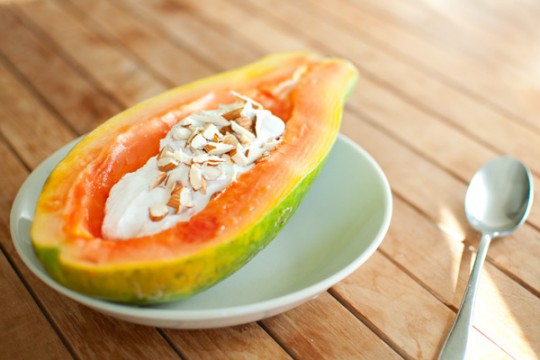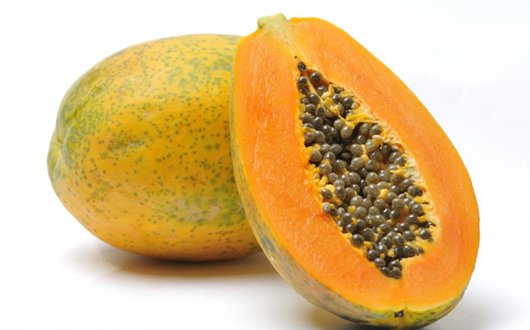
Sinfully sweet with a soft, butter-like consistency, it’s no wonder that Christopher Columbus deemed papayas the “fruit of the angels”.
Although once considered to be an exotic fruit, papayas are now fairly common in supermarkets year round, and it’s a good thing too! Pear shaped and roughly seven inches long, papayas have a rich orange colored flesh with yellow and pink hues.
Its seeds are also edible, however they have a slightly bitter and peppery taste.
Papayas are a beautiful, tropical fruit, but they are also highly beneficial nutritionally. With nearly 200% of your daily recommended intake of vitamin C, papayas are a great immune system booster.
It also contains 31% of the daily amount of vitamin A, which is essential for healthy skin and eyes. From helping protect our skin to fighting off cancer cells, this super fruit is definitely one you should be eating!
Health Benefits of Papaya

It protects the skin
Papaya is a beneficial source of vitamin C, vitamin E and carotenoids like beta-carotene and lycopene. The high levels of these antioxidants can help to protect your skin against free radicals that are known to cause damage, which leads to wrinkles and other visible signs of aging.
The skin of papayas contains an enzyme called papain that actually breaks down dead skin cells and can help promote skin renewal when used topically. Facial treatments made from papayas are popular for improving skin texture, elasticity and appearance. These treatments can also help heal wounds and burns as well as assist in the treatment of acne, blemishes and age spots.
Protects against arthritis
Arthritis can be a horribly debilitating disease, reducing the quality of life in a person significantly. The anti-inflammatory properties and vitamin C found in papayas can help fight various forms of arthritis. A study published in Annals of the Rheumatic Diseases showed that people were three times more likely to develop arthritis when they consumed foods low in vitamin C.
It’s good for your eyes
The beta-carotene found in papaya can be converted into vitamin A, an important nutrient for healthy eyes and vision. Papaya also contains two compounds called lutein and zeaxanthin. These phytonutrients known as xanthophylls are concentrated by the body in the macular region of your eyes. They protect against both UV and high energy blue light that can damage the eye’s retina.
Research has shown that a consistent intake of both zeaxanthin and lutein can help to significantly reduce the risk of developing age-related macular degeneration, or ARMD. ARMD is the most common cause of blindness in America. The high levels of lutein and zeaxanthin may also help to prevent cataracts, glaucoma, and other chronic eye diseases. If you stare at a computer screen for a large part of your day, daily intake of lutein and zeaxanthin may help to lessen eye strain, which can lead to headaches and migraines.
It protects the heart
Both the vitamin C and vitamin A, as well as the antioxidants beta-carotene and lycopene found in papayas, can reduce cholesterol oxidation in the arteries, which can potentially lead to heart attacks. When cholesterol becomes oxidized it is able to build up and stick to the blood vessel walls, forming dangerous plaque that can eventually lead to heart attack or stroke. Increasing your intake of these nutrients may improve blood flow and reduce the risk of heart disease. Papaya is also a good source of fiber, which can help lower bad cholesterol levels (LDL) in the blood by preventing its absorption during the digestion process.
Improves digestion
The enzymes in papayas, especially in the green fruits, help to improve digestion by breaking down proteins into individual amino acids. The enzyme papain that is found in papaya is actually so good at breaking down proteins that it is commercially used as a meat tenderizer.
May protect against cancer
The rich antioxidant content of papaya comes into play again with lowering the risk of certain cancers. Lycopene, beta-carotene and another less well known antioxidant, beta-cryptoxanthin, are particularly beneficial in reducing the risk of developing cancer. Enzymes in papaya can digest the protein layer of cancer cells that surrounds them and protects them. This can leave the cancer cells more open to the body’s immune system. These enzymes are also believed to hinder cancer cell growth and inhibit the cancer from spreading.
The fiber in papayas helps to protect against colon cancer specifically. It is able to bind to cancer causing toxins in the colon and keep them away from the healthy colon cells. In addition, the folate, vitamin C, beta-carotene, and vitamin E found in papaya have also been linked to a reduction of colon cancer.
Papayas also contain isothiocyanates, compounds that may help prevent cancer by removing harmful carcinogens from our bodies.
How To Incorporate Papaya Into Your Diet
When shopping for papayas, look for those that have a reddish orange skin and are soft to the touch. Simply cut the fruit like you would a melon, scooping out the seeds before enjoying the fruit.
- Though papayas are plenty delicious on their own, pair them with mango and pineapple for a fresh, summer fruit salad.
- Mash chunks of papaya into the tea, water, or lemonade for a delicious, fruit drink.
- Make a fresh salsa with papaya, mango, jalapeno, red peppers and chipotle pepper. Use as a topper for your favorite tacos.
- Freeze chunks of papaya to use for smoothies. Blend a few chunks along with some Greek yogurt, banana and almond milk for a sweet, tropical drink.
So whether you plan to serve it plain or diced up in a salsa, be sure to grab some papayas from the market on your next trip! You can’t go wrong with this deliciously sweet, yet highly nutritious super fruit.
Enjoyed Papaya Benefits & Diet (Updated)? Share it with your friends so they too can follow the Superfoodsliving journey.
Share on Pinterest
